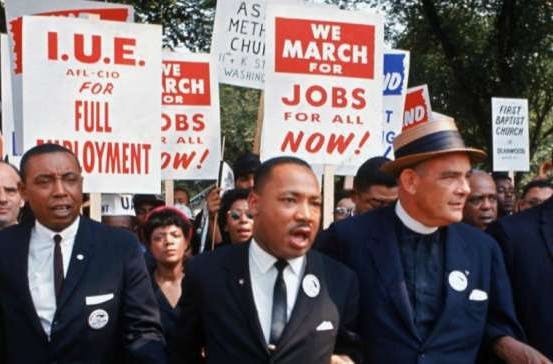Unemployment isn't necessary

Hundreds of thousands of people have lost their jobs in Australia over the last month. Many more have stopped receiving pay cheques but have not yet made it into the official figures. And this is only the beginning.
Unemployment does not arise only with the onset of economic collapse. It is a consistent feature of the capitalist economy. Even before the pandemic-induced mass shutdown of industry, official unemployment in Australia, one of the world’s strongest economies, stood at 5 percent. This figure understates the reality, taking into account only those actively looking for work. Those who have given up job-hunting but remain unemployed or are under-employed, working casual or very poorly paid jobs that don’t cover living costs, are not counted.
Why is it that even during times of economic growth, millions are left without a job? Karl Marx noted that capitalists are locked in perpetual competition with each other to realise ever greater profits. One of the most effective ways for an individual company to gain an advantage is by increasing the productivity of its workers, either by making them work harder for less, or by investing in machinery that means fewer workers are needed to produce more goods. This increases profits for bosses, but, for a section of the workforce, it means being forced to join the dole queue.
Take the car industry, the historic pioneer of labour-saving technology and production methods. In 1913, US industrialist Henry Ford introduced the conveyor belt to increase labour productivity in his factories, dramatically reducing the time it took to produce cars. Today, complex machines carry out tasks that once required dozens of workers.
A road to success, then, in capitalist terms, is more workers made unemployed. And what should be a collective gain for humanity – that less work is required to produce the same amount of stuff – becomes a curse for workers condemned to the poverty and indignity of unemployment.
This doesn’t mean that all jobs are being replaced by machines, or that mechanisation is the only cause of unemployment. Marx described the unemployed as a surplus population, or reserve army of labour. Workers are kicked out the door when industry doesn’t need them, brought back in when workplaces are established to serve new markets.
The existence of this reserve army helps hold down wages, enabling more value to flow to the top as profit. A large pool of unemployed people, desperate to work in order to survive, is a disciplining mechanism on the aspirations of the labour force. Fighting for a pay rise seems riskier when there are thousands of others the boss could use to replace you. “The condemnation of one part of the working class to enforced idleness by the overwork of the other part, and the converse”, wrote Marx, “becomes a means of enriching the individual capitalists”.
While unemployment is a consistent reality of life for many regardless of fluctuations in the economy, in times of recession and severe economic crisis mass unemployment becomes an act of all-out class war.
When stock markets crash, industry falters and profits are threatened, firing a large section of the workforce is a conscious move by bosses to prioritise their own interests and minimise their losses. To protect managerial salaries and shareholders, workers who are no longer considered to be profitable investments are thrown on the scrap heap and forced to wear the worst of the losses. This doesn’t mean a blow to the value of the workers’ share portfolios or net value, as it might for bosses, but food insecurity, the loss of homes and going without other basic necessities.
Capitalism dictates that people are of value only insofar as they constitute a profitable investment. The wealthy and powerful control all the resources on which human survival depends, from agriculture to construction materials. Only if you’re making money for a boss are you entitled to a decent life. To be denied employment is to be left to starve, or struggle on meagre welfare payments and charity.
Economic crises expose the irrationality of a profit-driven system. Crises occur, not because there is suddenly less need for the milk being dumped in ditches or for the electrical goods rusting in warehouses, but because, in capitalism, goods and services are produced, not to meet human need, but for exchange on the market.
The economy breaks down when profitable investment dries up. But people still need to be fed and clothed, and buildings built. Even in a crisis, resources are still available, as is the labour power required to transform them into useful things. But these are not brought together, because there are no profits to be made.
This would not be the case in a sane society. Take resources, add the ability of human labour to transform them into useful things, and you have the basis for fulfilling people’s needs. With conscious and rational planning, we could overhaul energy systems and production methods to mitigate the climate crisis and provide food, shelter and more to the billion people currently living in slums. We could figure out new and creative ways to produce things that wouldn’t result in greater poverty but instead free workers from burdensome types of labour. Once basic needs are met, the sky’s the limit when production is for human need, not profit.
But none of this will happen so long as capitalism remains. Necessary resources and labour will remain idle, likely at an accelerated rate in coming years. The cycles of forced destitution will continue.
The alternative is to wrench power and economic control away from the bosses and democratise the economy and society under workers’ collective control. In doing so, we can leave the wholly unnecessary evils of poverty, unemployment and overwork behind us.